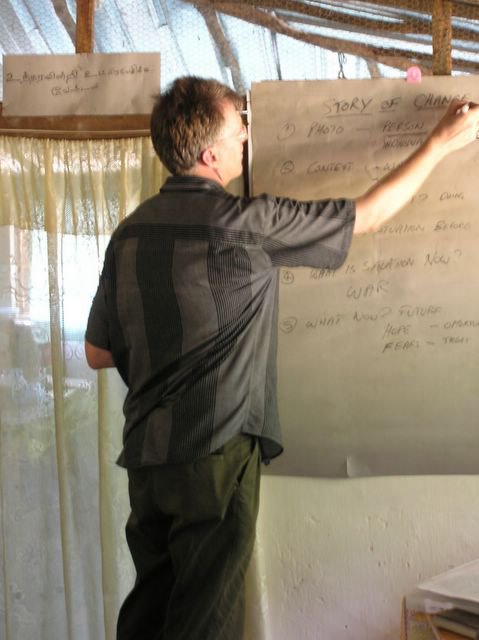
Nonviolent Peaceforce (NP) is not all about providing unarmed civilian peace keepers in areas of conflict. Here I am meeting a respected intellectual and faith leader, Venerable Bellanwila Wimalaratne Thero, at his ancient vihara (temple) in south Colombo.
He is well known for his inter-Faith work and had just returned from a visit to Jaffna and other northern parts of Sri Lanka with faith leaders from the Sri Lanka Christian, Hindu and Islamic traditions.
It is vital that wider civil society understands the scope and nature of NP's work and indeed, in Sri Lanka, negative media coverage has hampered NP's engagement with the community. After a string of work permit refusals, often given prominence in the press, we have now had a string of extensions for our international staff. From this we can draw some comfort. However it is vital to reach out to all sections of the community to inform them about the nature of NP, who supports it and how it operates. Without a clear understanding of our work getting to the communities where our protective presence is needed can be impossible.
I went to meet Professor Wilmalaratne Thero along with two of our local NP staff, Bernard and Pakrama. The Bellanwilla Temple, where the Thero is the incumbent, just happens to be where Pakrama and his family worship and so he was able to make the introduction. Our discussion was illuminating. The Venerable Thero spoke of the widespread suspicion of development agencies and the palpable fear of what are perceived as 'their hidden agendas'. The type of people who become staff of NP, its origins as an organisation and its current funding sources, were all discussed to give the Thero an idea about where 'we' are coming from. Sri Lanka has clearly suffered from a 'cultural invasion' of NGOs particularly since the Tsunami and, further, 'good governance' of NGOs is not universal. Suspicion is understandable!
We learnt of religiously motivated church agencies who still use relief and humanitarian assistance as tools for proselytising. Given this context the Thero is not alone in displaying caution in relating to Non-Governmental Organsation. But he was equally critical of government for not fully engaging with civil society organisations, who have a vital role to play in helping to build reconciliation in Sri Lanka. This beautiful country has too often suffered and been brutally scarred by conflicts often ascribe to self-seeking politicians.
When I come back to Sri Lanka I very much hope to be able to meet the Thero again and explore how we might cooperate in popularising the concept of 'Unarmed Civilian Peace-keeping'


No comments:
Post a Comment